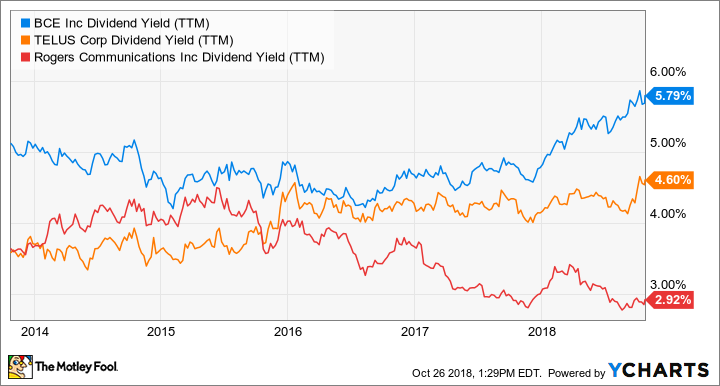When Should You Buy the Best Telecom Stock?

The market goes down, but dividend income gives you real cash to spend or reinvest. Telecoms, including BCE (TSX:BCE)(NYSE:BCE), Rogers Communications (TSX:RCI.B)(NYSE:RCI), and TELUS (TSX:T)(NYSE:TU) offer stable dividends.
Which is the best telecom to buy today? Let’s review the companies.
BCE Dividend Yield (TTM) data by YCharts. Compare the dividend yields of BCE, Rogers, and TELUS.
BCE
BCE is the biggest communications company in Canada. It is vertically integrated with a recent revenue mix of roughly 37% wireline broadband and TV, 17% wireline voice, 35% wireless, and 11% media.
BCE stock has corrected about 18% from its 52-week high. Some investors blame increasing interest rates for the drop. However, I think it has more to do with the telecom’s slower growth compared to the other two telecoms, and the stock was trading at a pretty rich price-to-earnings multiple (P/E) of +18 when it traded at +$60 per share.
At $51.43 per share as of writing, BCE is actually holding up pretty well at a P/E of 14.8, as it’s estimated to grow its earnings per share roughly at the pace of inflation of up to 4% per year for the next three to five years.
BCE offers a relatively high dividend yield of 5.87%, which is near its 10-year high. Its dividend should be safe, as the company has solid free cash flow generation. Investors can expect BCE’s dividend growth to roughly match inflation.
That said, the stock could very well continue to be pressured in the current market, but it should get some strong support at a 7% yield or a price of about $43.15 per share.

Rogers Communications
Rogers stock has held up the best so far in this market downturn. It had a recent revenue mix of 59% wireless, 26% cable, and 15% media, which translated to earnings before interest, taxes, depreciation, and amortization (EBITDA) of 66% wireless, 32% cable, and 2% media. Rogers’s 2017 revenue and EBITDA were $14.4 billion and $5.5 billion, respectively.
At $65.75 per share as of writing, Rogers trades at a P/E of about 16. That’s a reasonable multiple, seeing as it’s estimated to grow its earnings per share by about 7-8% per year for the next three to five years.
Rogers has frozen its dividend per share since 2016 and focused on improving its business operations and performance. This has proved to be a successful strategy that’s evident by price appreciation of about 37%, which is supported by earnings growth. (Comparatively, BCE stock was down about 4%, and TELUS stock was up about 16%.)
Because of its turbocharged stock price appreciation, Rogers only offers a 2.92% yield, albeit a solid one.
TELUS
TELUS is a fast-growing telecom. It generates annualized revenues of about $13.8 billion. It has roughly 13.1 million subscriber connections, including nine million wireless subscribers, 1.8 million high-speed internet subscribers, 1.3 million residential network access lines, and 1.1 million TELUS TV customers.
TELUS’s subscriber connections increased at a compound annual growth rate of 1.83% in the past five years. That doesn’t seem like a high growth rate, but it has been able to charge more per subscriber over time.
At $44.68 per share as of writing, TELUS trades at a P/E of about 16 and offers a 4.7% yield. The telecom trades at a reasonable multiple because it’s estimated to grow its earnings per share by about 8% per year for the next three to five years.
TELUS is a consistent dividend grower. It has increased its dividend per share every year since 2004, and it has a dividend policy to increase its dividend per share by 7-10% per year through 2019. After that, I expect management to renew the policy and continue increasing the dividend.
Investor takeaway
Of the three telecoms, TELUS seems to offer the best of both worlds — a nice dividend yield of about 4.7% and decent earnings growth to usher the share price higher in the long run. Currently, it’s proper to buy some shares of the Steady-Eddie name if you’re looking for stability. For a safer entry point, aim for a yield of close to 6% or buy close to $35 per share.
More reading
Should HEXO Corp or Aurora Cannabis Be Your Top Recreational Pot Stock Pick?
TFSA Investors: 3 Stocks Yielding up to 10.5% That I'd Buy Right Now
Free investor brief: Our 3 top SELL recommendations for 2018
Here's Why Toronto Dominion Bank Should Be in Your Investment Portfolio
Fool contributor Kay Ng has no position in any of the stocks mentioned.

 Yahoo Finance
Yahoo Finance 
